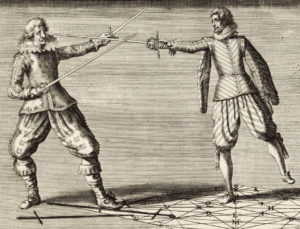Please see the introduction of this series for more information on the authors and context.
During the Duel des Mignons, one of the participants complained that he had only his sword while his opponent was armed with a sword and dagger. These obviously mismatched weapons, in our modern eyes, seem like they would pose a definite fairness problem, and equality of weapons was indeed a strong concern in the earlier judicial duels. Interestingly it does not seem to have been entirely clear-cut in the mind of contemporaries. The question was whether sword and dagger was the weapon set agreed beforehand (implicitly or explicitly!), in which case the man who had forgot his dagger was to blame. Pierre de Bourdeilles gives another example of the question, just after his relation of the Duel des Mignons:
On that topic I will bring up an example of a gentleman from Anjou, named la Fautrière, having met for a fight in an old barn, still enclosed by its four walls, upon which the seconds, thirds and others were overseeing the combat, which was between the youngest d’Aubanye, gentleman of Angoumois near Ruffec, very brave and courageous gentleman, and very bold, and who wanted to mimic M. de Bussy in everything, but could not in any way ; figuring this, it gave him a good laugh1. This Aubanye had stayed five years in Rome, learning to handle weapons (including the sword alone) from the Patenostrier, very excellent in this art ; so that being ready to fight, said Aubanye told his ennemy : “Brother, I am only used to fighting with the sword alone ; I have not brought a dagger, therefore discard your own”. The other at once threw his over the barn’s wall, and had such luck that he vainquished and killed Aubanye, who was among the most esteemed swordsman for sword alone and a hundred time more skillful than the other. More than a few then blamed him to have thus complied to his ennemy and given him such an advantage, which would have been well used if Aubanye had killed him ; but in that he showed great bravery. This fight occured during the last wars of the League, near La Rochelle ; both were protestants and followers of the king of Navarre. Brantôme, Discours sur les duels, p.314TranscriptionDonc sur ce je vous en amèneray un exemple d’un gentilhomme d’Anjou, nommé la Fautrière, ayant entré en estaquade dans une vieille grange, mais pourant enfermée de ses quatre murailles, sur lesquelles les seconds et tiers et autres en advisoient le combat, qui fut entre le cadet d’Aubanye, gentilhomme d’Angoumois près de Ruffet, fort brave et vaillant gentilhomme, et fort bravasche, et qui en tout vouloit fort imiter M. de Bussy, mais il ne peut en aucune sorte ; se le figurant, cela luy faisoit grand bien à la ratelle pourtant. Cestuy donc Aubanye avoit demeuré cinq ans à Rome, apprenant ordinairement à tirer des armes (et mesmes de l’espée seule) du Patenostrier, très-excellent en cet art ; si bien qu’étant prests à se battre, ledict Aubanye dist à son ennemy : “Frère, je n’ay accoustumé à me battre qu’à l’espée seule ; je n’ay point porté de dague, pour cela ostez la vostre”. L’autre, aussitost prompt, jetta la sienne par dessus la muraille de la grange, et la fortune luy fut si grande qu’il vainquit et tuea ledict Aubanye, qui estoit un des plus estimez espadassins pour l’espée seule et des plus adroicts cent fois plus que l’autre. Un chascun après le blasma, pour avoir ainsi compleu à son ennemy, et gratifié d’un tel advantage, et qu’il fust été bien employé si Aubanye l’eust tué ; mais en cela il monstra un grand courage. Ce combat fut faict en ces dernières guerres de la Ligue, près la Rochelle ; car tous deux estoient huguenots, et suivoient le roy de Navarre.
This event gives more perspective on the problem. One can see here how superior training in one weapon set might have been conceived as an unfair advantage too! Although here, training did not save Aubanye, even with his favourite form… The notion of what was a fair duel in the novel “à la mazza” form was evidently being explored, and not settled at that point in time, at least in the mind of the duellists.
The master Patenostrier mentioned is the author of a small treatise, now only accessible through the period French translation by Villamont as far as I know (a modern English translation is also available). This is one of the rare examples of cross-references between technical fencing treatises and the general literature of the time. He seems to have enjoyed some notoriety in the French circles at least; he is cited again in Dancie’s treatise.
- I am not quite sure what exactly Pierre de Bourdeille means here. The litteral translation would be : “this did him much good to the spleen”, and the only French idiomatic expressions I know involving the spleen have to do with laughing. ↩︎



